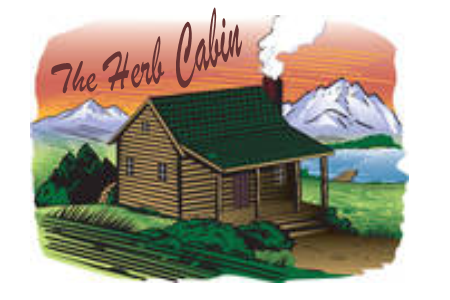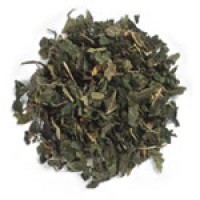Nettle leaves are a blood builder often used as a spring tonic and to
treat anemia and poor circulation. They contain both iron and vitamin
C, which aids iron absorption. In the past, nettle was eaten or sipped
to reduce uric acid and to treat gout and arthritis. It encouraged
mother's milk, lowers blood sugar and decreases profuse menstruation. It
acts as a light laxative and diuretic (possibly due to its flavonoids
and high potassium content). Both a tea and a poultice of cooked nettles
are used to treat eczema and other skin conditions (combines well with
figwort and burdock).
An astringent that stops bleeding, the
powder is snuffed to stop nosebleeds. Curled dock leaves provide a
remedy for the nettle's sting and the fresh juice of nettles themselves
relieves the sting as well. Nettle is used by asthmatics-mix the juice
of the leaves or roots with honey, take to relieve bronchial or
asthmatic troubles.
The seeds were once thought to allay
consumption, the infusion being taken in wine glass doses. They were
also given in wine as a cure for ague, in powder form they were used for
goiter, also important in reducing diets. It was thought that a fever
could be cured by pulling a nettle up by the roots, reciting the names
of the sick man and his parents.
Nettle tea was once used for
dropsy and as a diuretic. Tincture of nettle is made of 2 oz of the
green herb to one pint of proof spirit; Infusions are made by adding 1
oz of the herb to a pint of boiling water.
Properties:
astringent,
diuretic, tonic, nutritive, stops bleeding, circulatory stimulant,
promotes milk flow, lowers blood sugar levels, prevents scurvy
Applications:(of aerial parts)
Infusion:
take to stimulate the circulation and to cleanse the system in
arthritis, rheumatism, gout, and eczema. Also increases milk flow in
nursing mothers. The fresh shoots make a revitalizing spring tonic
Tincture: used in combinations for arthritic disorders, skin problems,
and heavy uterine bleeding.
Compress: soak a pad in the tincture, and apply to painful arthritic joints, gout, neuralgia, sprains, tendonitis, and sciatica
Ointment: apply to hemorrhoids
Wash: apply to burns, insect bites and wounds
Juice:
liquidize the whole fresh plant to make a good tonic for debilitated
conditions and anemia and to soothe nettle stings. Prescribed for
cardiac insufficiency with edema Powder: the powdered leaves are inhaled
as snuff for nosebleeds
Decoction of root: use as a rinse for
dandruff, falling hair and as a general conditioner; Take 1 cup daily
for enlarged prostate. Prostate-Reducing Tincture: 1 oz tincture of saw
palmetto berries, ½ oz each tinctures of nettle root, sarsaparilla root,
wild yam root, Echinacea root and pipsissewa or uva ursi leaves.
Combine ingredients. Take half a dropperful 3 times a day. For a
maintenance dose, take once a day.
Veterinary uses:
Chickens:
stinging nettle seeds strongly stimulate the laying capacity of hens.
During the winter, mix them with the grain feed once in a while.
Dogs:
a powder made from dried nettle herb can occasionally be mixed into
your dog’s food. It will give your pet a shiny coat and help prevent
rheumatic conditions.
Geese and Ducks: fresh, finely chopped
nettles make excellent fodder for rearing young geese and ducks. For
ducks from the time of hatching until the 10th week, feed them barley
meal, wheat bran, chopped nettles, and rolled oats. Mix these
ingredients in equal parts with enough sour cream to make a thick mash.
For Geese from the time of hatching until the second week, feed them
hard-cooked eggs and nettles, both finely chopped, mixed in equal parts,
and unmoistened. From the third week on, feed them barley groats, wheat
bran, and finely chopped nettles. Again, mix them in equal parts
without moistening them. Use this feed until the young gees are halfway
fledged.
Horses: Nettles are a strong medicine and should not be
fed in excess to a horse. A little of the seed scattered occasionally
into the fodder is sufficient to keep the animal healthy.
Dairy
Cattle and Sheep: Stinging nettles stimulate milk production. During
winter give a bunch of dried nettles every day to cows and sheep.
Nettle Stinging Herb - anemia, poor circulation, uric acid
- Product Code:MH038
- Availability:In Stock
-
R61.50
Available Options
Tags: Nettle Stinging Herb, anemia, poor circulation, uric acid

